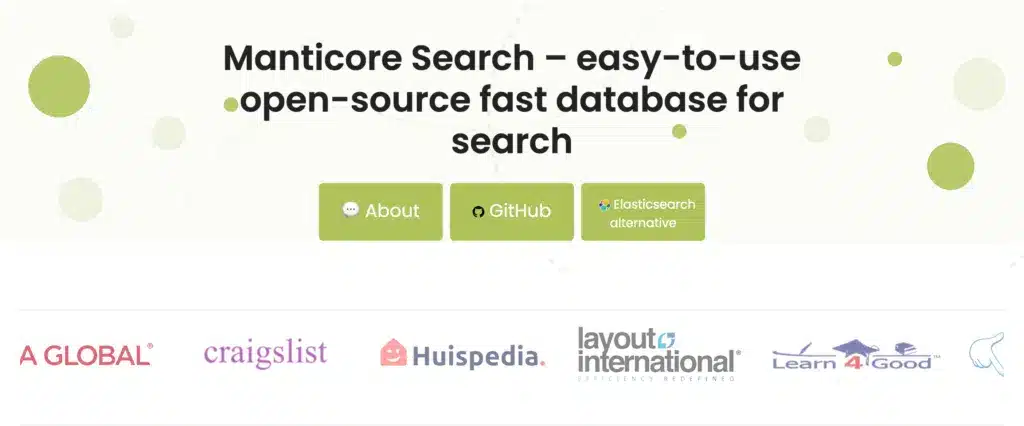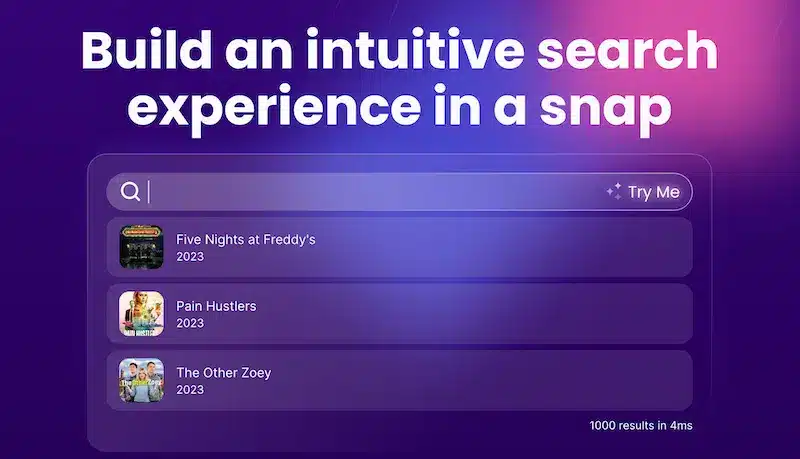The Importance and Challenges of Full-Text Search
Full-text search is vital for data management and retrieval, from simple website searches to complex queries. Efficiently searching vast amounts of text is necessary for most online applications, but it presents unique challenges.
It requires a delicate balance between speed, accuracy, search string capacity, and resource management, mainly when dealing with large databases and complex queries. Choosing a suitable database and search technology is crucial for businesses and developers to ensure a system’s performance and usability.
We will explore the limits of MySQL Full-Text search and explore alternative solutions.
Introduction to MySQL Full-Text Search Capabilities
MySQL offers a built-in full-text search feature for quick and efficient search queries on small datasets. It supports a boolean mode modifier, ranking results, wildcard operator, and more. Still, the full-text query performance is quickly affected as data grows, and the WHERE clause uses more than one predicate.
The Motivation for Seeking Alternative Solutions
We recently discovered that MySQL’s full-text search has significant limitations, particularly when scaling for larger datasets with one or more columns with complex search criteria.
Multiple predicate search queries resulted in a noticeable decrease in performance, making it clear that MySQL’s full-text search is not the best option for systems requiring advanced search capabilities.
As a result, we explored alternative full-text search solutions, including Sphinx Search, Meilisearch, Searchblox, and Singlestore, each offering distinct features and advantages over MySQL.
This exploration showed that various full-text search technologies are available, each suited to different use cases and performance requirements.
Top Limitations of MySQL Full-Text Search
- Limited performance with large datasets
- Cannot handle multiple predicates well
- Basic ranking and relevance scoring
- Lacks fuzzy search and multilingual NLP
- No distributed architecture
- Minimal configuration and tuning options
MySQL Full-Text Performance Issues
MySQL’s full-text search is significantly limited when handling queries with multiple predicates, also called query expansion search. As the complexity of a search string query increases, MySQL’s performance degrades considerably when using additional predicates not included in the full-text search index, whether when using a natural language search or a boolean search string.
By default or with the IN NATURAL LANGUAGE MODE modifier, the MATCH() function performs a natural language search for a string against a text collection. A collection is a set of one or more columns included in a FULLTEXT index. (Ref: MySQL 8.0)
In the example below, note that we created a full-text index on two columns to avoid using OR with the where clause.

As you can see, the query executes very fast.
Performance goes out of the window when you add a second filter in the where clause (and column_id = 164 below). We had to cancel the query after 5 minutes, regardless of whether we used a Boolean or natural language search.

We merged the view into one table and maintained one full text index on two columns. (in boolean mode)

Even with the proper indexed columns, the query still performed very poorly. (14 seconds). And if we add the additional filter (and column_id = 164), the query takes more than 5 min.
This poses a substantial challenge for applications requiring real-time search results across large datasets or executing complex queries regularly. It’s unusable.
This additional predicate WHERE clause filter seems to be a bug in Mysql full-text search using the InnoDB engine, as mentioned in this post and this one.
Scalability Challenges
As we just saw, scalability becomes critical as the database grows. The full-text search in MySQL is not inherently designed to handle massive, enterprise-level databases efficiently.
Data increases, leading to challenges in maintaining fast, responsive search capabilities. For businesses anticipating rapid data volume growth, relying solely on MySQL’s full-text search can become a bottleneck, hindering the ability to scale their systems effectively.
Limited Flexibility and Customization
MySQL’s search engine lacks modern features such as:
- Fuzzy search
- Typo tolerance
- NLP integration
- Custom scoring and ranking algorithms
This makes it less viable for multilingual or semantically rich use cases.
MySQL’s full-text search is also limited in its text analysis and natural language mode support. It can challenge applications requiring multiple language support or specialized text processing.
Comparing Full-Text Search Options
| Feature | MySQL FTS | Elasticsearch | ClickHouse (w/ Extensions) |
| Scalability | Low | High | High |
| Relevance Scoring | Basic | Advanced | Moderate |
| Fuzzy/Tolerant Search | No | Yes | Yes |
| Real-Time Indexing | No | Yes | Partial |
| ML/NLP Support | No | Yes | Experimental |
| Distributed Architecture | No | Yes | Yes |

Exploring Alternative Solutions
To address MySQL full-text searching limits, we evaluated several alternatives, including Sphinx Search, Meilisearch, Searchblox, and Singlestore. Each platform offers unique features and strengths to address MySQL’s scalability, complex query performance, and customization and language support flexibility limitations.
Sphinx Search: A Powerful Standalone Search Engine
Sphinx Search is a high-performance search engine designed for high performance on a single CPU core. It handles large data volumes and complex queries more efficiently than MySQL’s full-text search.
With advanced features like a built-in full-text parser, stopword lists, highest relevance sorting, full-text indexing, and relevance-based ranking, the Sphinx full-text search engine is ideal for applications where search speed and accuracy are paramount. It can also be integrated with MySQL databases to enhance their search capabilities.
Meilisearch: User-Friendly and Instant Search Results
Meilisearch is a new full-text search tool that prioritizes ease of use and delivers typo-tolerant results instantly. It features a simple API, real-time indexing, and easy handling of complex queries, making it an excellent choice for user-centric applications. Its lightweight and fast performance make it suitable for small to medium-sized applications that value simplicity and functionality.
Searchblox: Enterprise-Grade Search Functionality
Searchblox is a customizable search solution for large businesses. It supports different document formats and languages and has advanced features like sentiment analysis, text analytics, and faceted search. It integrates with multiple data sources and prioritizes security and compliance, making it popular among more prominent organizations.
SingleStore Full-Text Search v2
A hybrid OLAP/OLTP database designed for fast analytics and search queries. Offers real-time performance and large-scale scalability. They just released their newest 2.0 version based on
Sphinx Search: Pros and Cons
Sphinx Search is part of open-source alternatives for a search engine that quickly and effectively searches through large amounts of text. It is compatible with SQL databases like MySQL and PostgreSQL, as well as non-SQL sources.
Sphinx offers several text processing features, such as morphology processing, stopwords, and tokenization. With real-time indexing, Sphinx ensures that data updates are promptly reflected in search results, which is particularly important for dynamic databases.
Sphinx’s speed and ability to search through vast amounts of textual data make it a powerful search engine. Its indexer can scan large amounts of data and index multiple columns based on the config file.
Pros of Sphinx Search
High Performance and Scalability: Sphinx is engineered for performance. It can handle large volumes of data and complex queries more efficiently than many of its counterparts, including MySQL’s full-text search. This makes it particularly suitable for applications where search speed is critical.
Advanced Search Features: Sphinx offers advanced search capabilities like ranking modes, proximity search, and field-specific searches. These features enable more precise and relevant search results, enhancing the user experience.
Flexibility and Integration: Sphinx’s ability to integrate with SQL databases and its support for various data formats make it a versatile solution. It can be used as a standalone search server or integrated into existing database systems to enhance search capabilities.
Cons of Sphinx Search
Complexity in Setup and Management: Sphinx’s advanced features and capabilities come with a complexity that might be daunting for beginners or small teams. Setting up and optimizing Sphinx to suit specific needs requires particular technical expertise.
Less Frequent Updates and Community Support: Being an open-source project, Sphinx might not have as frequent updates or robust community support as some commercially backed search engines. This could be a concern for projects requiring cutting-edge features or regular updates.
Limited Built-in Natural Language Processing (NLP) Capabilities: While Sphinx is excellent for structured text searches, there may be better choices for applications requiring sophisticated natural language processing or semantic search capabilities.

Sphinx Search is pretty old. If you look for documentation on the web, don’t be surprised to read posts ten years old.
Sphinx Search has a recent new version, but I’m unsure how much support there is. There is also a Sphinx Search spinoff called Manticore Search.
The most challenging part of our first search using SphinxSeach was setting up the config file to pull and index data from the database. We ran into a memory issue; there seems to be a 4GB limit.
Meilisearch: A Modern Approach to Full-Text Search
Introduction to Meilisearch and Its Unique Features
Meilisearch is a user-friendly search engine known for its speed and simplicity. It delivers a fast, typo-tolerant search experience, making it easy to find relevant results even with imprecise queries. Meilisearch is lightweight and easy to set up, offering an intuitive search experience out of the box.

Meilisearch Performance and Usability Comparison with MySQL
Instant Search Results and Typo Tolerance: Meilisearch excels in delivering instant search results, a feature significant for user-facing applications. Its ability to handle typos and approximate searches effectively enhances the user experience, which MySQL’s full-text search needs to be equipped to do.
Ease of Integration and Use: Meilisearch’s simplicity in setup and integration is a significant advantage, especially for smaller teams or projects with limited resources. It requires less configuration and maintenance compared to MySQL, making it more accessible for those who need a straightforward yet powerful search solution.
Real-time Indexing: Unlike MySQL, Meilisearch offers real-time indexing, meaning that updates to the database are immediately reflected in the search results. This feature is crucial for dynamic websites or applications where content changes frequently.

Meilisearch Ideal Scenarios
Small to Medium-Sized Applications: Meilisearch is particularly well-suited for small to medium-sized applications where ease of use and quick implementation are vital considerations. Its lightweight nature makes it ideal for startups and projects with limited technical resources.
User-Centric Search Experiences: For applications where the user experience is paramount, such as e-commerce platforms or content-driven websites, Meilisearch’s fast, typo-tolerant search capabilities provide a significant advantage.
Rapid Development Environments: In scenarios where rapid development and deployment are required, Meilisearch’s ease of setup and low maintenance requirements make it a preferred choice, allowing teams to implement a robust search feature with minimal overhead.
Searchblox: Enterprise-Grade Search Solutions
Overview of Searchblox Capabilities
Searchblox is an enterprise search platform for large organizations. It offers text analytics, machine learning, and natural language processing capabilities to handle complex search scenarios.
Searchblox can index and search various document formats and data sources, including websites, databases, file systems, and cloud storage. Its user-friendly interface and customization options provide a tailored search experience.
Searchblox Enterprise-Level Features and Customization
Advanced Text Analytics and NLP: Searchblox excels in advanced text processing capabilities, including sentiment analysis, entity extraction, and semantic search. These features enable organizations to derive deeper insights from their data and offer more relevant search results to users.
Scalability and Security: Designed for enterprise environments, Searchblox can scale to accommodate large data volumes and concurrent search requests, a crucial requirement for large-scale operations. It also emphasizes security and compliance, offering features like secure indexing and the ability to work within private networks.
Integration and Compliance: Searchblox supports integration with various enterprise systems and data sources, making it a versatile tool for different industries. Its compliance with data regulations, such as GDPR, is an added advantage for data privacy and security organizations.
Searchblox Challenges and Considerations
Complexity in Deployment and Management: Implementing Searchblox in an enterprise environment requires careful planning and resources. Its extensive features and capabilities might necessitate a dedicated team for setup and ongoing management.
Cost Factor for Small Businesses: While Searchblox offers a robust set of features, the cost may be a consideration for smaller businesses or startups. Investing in this enterprise-grade solution is most justified for organizations leveraging its full functionalities.
Learning Curve for Maximizing Benefits: To fully utilize the advanced features of Searchblox, users may need to navigate a learning curve. Proper training and familiarization with the system are essential to harness its full potential and achieve the desired search efficiency and accuracy.
Singlestore: The Unified Database for Fast Analytics
SingleStore is a high-performance database for diverse data workloads, from transactions to analytics. It excels at real-time analytics and fast data retrieval. Its architecture enables rapid processing of large data volumes, an advantage for real-time decision-making.
Comparison of Performance and Scalability with MySQL
Superior Performance in Real-Time Analytics: Singlestore excels in scenarios where speed is critical, offering near real-time analytics and search capabilities. This is a substantial improvement over MySQL, especially in use cases involving large datasets and complex queries, where MySQL’s performance might falter.
Scalability for Modern Data Needs: The platform is designed for scalability and can accommodate growing data needs without a drop in performance. This scalability is a crucial differentiator from MySQL, making Singlestore a more suitable option for organizations looking to future-proof their data infrastructure.
Hybrid Data Management: Singlestore’s ability to handle transactional and analytical workloads within the same platform offers a unique advantage. This hybrid approach reduces the need for separate systems for different types of data workloads, simplifying the data architecture and potentially reducing costs and complexity.
There are many advantages to Singlestore performance and scalability over MySQL. For more information on how to scale MySQL, click here, and if you are looking for the best database for real-time analytics, you can read this recent article.
After importing data into Singlestore, we could execute the query per requirements using multiple columns full-text indexes, and another column (column_id in the example below).
The results were pretty impressive—less than 0.50 seconds. The good news is search terms in the Singlestore table can be updated in real-time without affecting the search performance.

Conclusion: Navigating the Full-Text Search Landscape
When it comes to full-text search solutions, choosing the right tool for your needs is essential.
While MySQL can work for basic needs, it may not be scalable or customizable enough for larger or more complex projects. Other tools, such as Sphinx Search, Meilisearch, Searchblox, and Singlestore, are available, each with strengths and benefits.
To make the best choice, consider your application requirements, including data size, query complexity, required search features, and technical architecture.
It’s also essential to understand the strengths and limitations of each tool to ensure scalability, performance, and a seamless user experience.
As data grows in size and complexity, navigating the landscape of full-text search technologies effectively is essential. By choosing the right tool for your needs, you can harness the full potential of your data assets and ensure your project’s success.
Need Help Migrating from MySQL Full-Text Search?
Our consultants at Data Sleek can help evaluate your full-text search needs and recommend the best scalable solution—whether it’s ClickHouse, Elasticsearch, or another modern platform.
Do you need assistance in navigating full-text search options? Data Sleek is here to help. Contact us for expert solutions.







